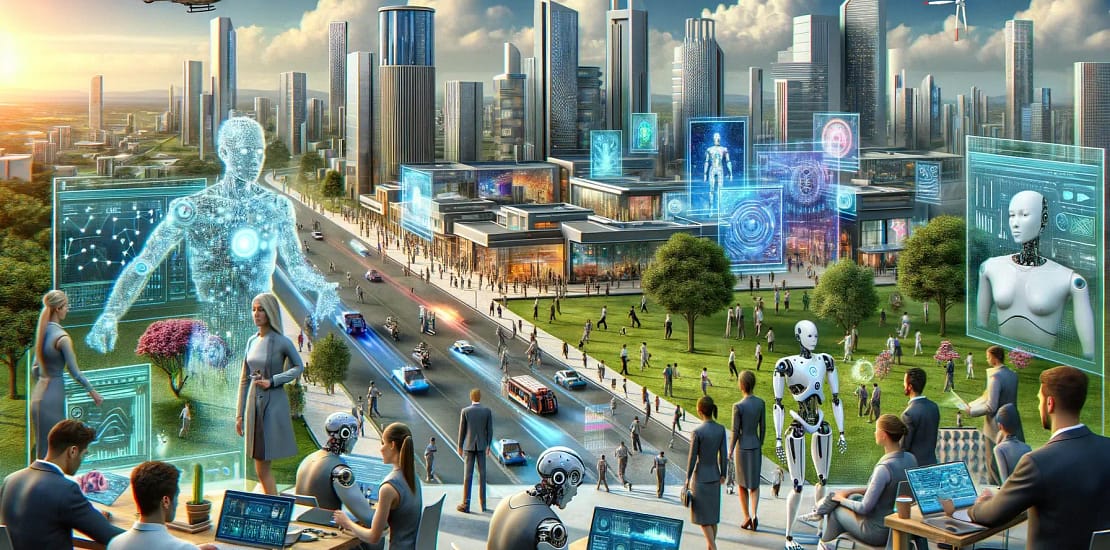AI and the Future of Jobs: Navigating the New Workforce Landscape
- March 13, 2024
- Posted by: Cheryl Li
- Category: Future of AI & Automation

The advent of Artificial Intelligence (AI) is reshaping the workforce landscape, heralding a new era of innovation and efficiency while also stoking fears of job displacement and skill redundancy. As AI technologies become increasingly integrated into various sectors, the nature of work, employment patterns, and required skill sets are undergoing profound transformations. This blog post explores the multifaceted impact of AI on the future of jobs, highlighting the challenges and opportunities it presents, and offering insights into how individuals and organizations can navigate this evolving landscape.
The Dual-edged Nature of AI in the Workforce

AI’s impact on the job market is paradoxical, characterized by its potential to both create new opportunities and challenge existing employment paradigms. On one hand, AI can automate routine tasks, freeing up human workers for more complex and creative endeavors. On the other hand, the automation of certain roles, particularly those involving repetitive tasks, raises concerns about job displacement and the need for reskilling.
Job Displacement and Automation
The automation capabilities of AI are a double-edged sword. Industries such as manufacturing, logistics, and even some aspects of customer service are witnessing a shift towards automation, where AI systems can perform tasks more efficiently and without human fatigue. While this increases productivity, it also raises concerns about the displacement of workers in roles vulnerable to automation.
Job Creation and Evolution
Conversely, AI is also a significant job creator, giving rise to new roles and industries that were previously unimaginable. From AI specialists and data scientists to roles focused on the ethical implications of AI, such as AI ethicists, the technology is spawning a demand for new skill sets. Moreover, AI is transforming existing jobs, enriching them with new tools and capabilities that enhance productivity and creativity.
Skills in Demand: Adapting to an AI-driven Workforce
The evolution of the job market under the influence of AI underscores the importance of adaptability and lifelong learning. Skills in data literacy, AI fluency, and digital competencies are becoming increasingly valuable, alongside soft skills such as creativity, critical thinking, and emotional intelligence that are beyond the current capabilities of AI.
The Rise of Hybrid Roles
The future workforce landscape is likely to be characterized by hybrid roles that blend technical proficiency with domain-specific knowledge. Professionals will need to leverage AI tools to augment their expertise, whether in fields like healthcare, where AI can aid in diagnosis, or in creative industries, where AI can assist in design processes.
The Importance of Continuous Learning
As AI continues to evolve, so too will the skills required to work alongside it. Embracing a mindset of continuous learning and professional development will be crucial for individuals looking to remain relevant in an AI-driven job market. This includes both formal education and self-directed learning to keep pace with technological advancements.
Navigating the Transition: Strategies for Individuals and Organizations
The transition to an AI-driven workforce necessitates proactive strategies from both individuals and organizations to mitigate challenges and capitalize on the opportunities AI presents.
For Individuals: Embracing Change and Upskilling
- Stay Informed: Keeping abreast of AI trends and their implications for your industry can help you anticipate changes and adapt accordingly.
- Upskill and Reskill: Investing in education and training to acquire new skills or enhance existing ones, particularly those related to AI and digital technologies, is essential.
- Cultivate Soft Skills: Enhancing skills such as problem-solving, adaptability, and emotional intelligence can provide a competitive edge in an AI-driven job market.
For Organizations: Fostering a Future-ready Workforce
- Invest in Employee Development: Organizations should provide training and development opportunities to help employees adapt to new technologies and roles influenced by AI.
- Adopt a Human-Centric Approach to AI: Integrating AI into the workplace should augment human capabilities, not replace them. Designing AI systems that complement human workers can maximize efficiency and innovation.
- Promote an Adaptive Organizational Culture: Cultivating a culture that embraces change, encourages innovation, and supports continuous learning is key to navigating the AI-driven transformation of the workforce.
The Ethical and Societal Implications of AI in the Workforce
As we navigate the future of jobs in an AI-driven world, ethical considerations and societal impacts must be at the forefront of the conversation. Ensuring that the benefits of AI are equitably distributed, addressing potential inequalities arising from automation, and developing policies to support those impacted by technological disruption are critical challenges that society must address.
Policy Interventions and Social Safety Nets
Governments and policymakers play a crucial role in shaping the future of work in the age of AI. Implementing policies that encourage innovation while also providing safety nets for displaced workers, such as retraining programs and unemployment benefits, can help smooth the transition to a new workforce landscape.
The Future of Work: An AI-enhanced Horizon
The future of jobs in the AI era is not a zero-sum game between humans and machines but a new frontier of collaboration that can lead to unprecedented growth and innovation. By leveraging AI to enhance human capabilities, fostering a culture of lifelong learning, and addressing the ethical and societal implications of technological change, we can navigate the challenges and opportunities of this new era with optimism and resilience.
Conclusion
The impact of AI on the future of jobs is a complex tapestry of challenges and opportunities, calling for adaptability, foresight, and ethical consideration. As we stand on the brink of this transformative era, the collective efforts of individuals, organizations, and societies will determine the trajectory of the workforce landscape. Embracing AI as a tool for augmentation rather than replacement, prioritizing education and skill development, and fostering an inclusive approach to technological advancement can ensure that the future of work is characterized by innovation, equity, and human-centric collaboration. In this journey, the harmonious integration of AI into the workforce holds the promise of not only elevating productivity and efficiency but also enriching the human experience of work in profound and meaningful ways.

